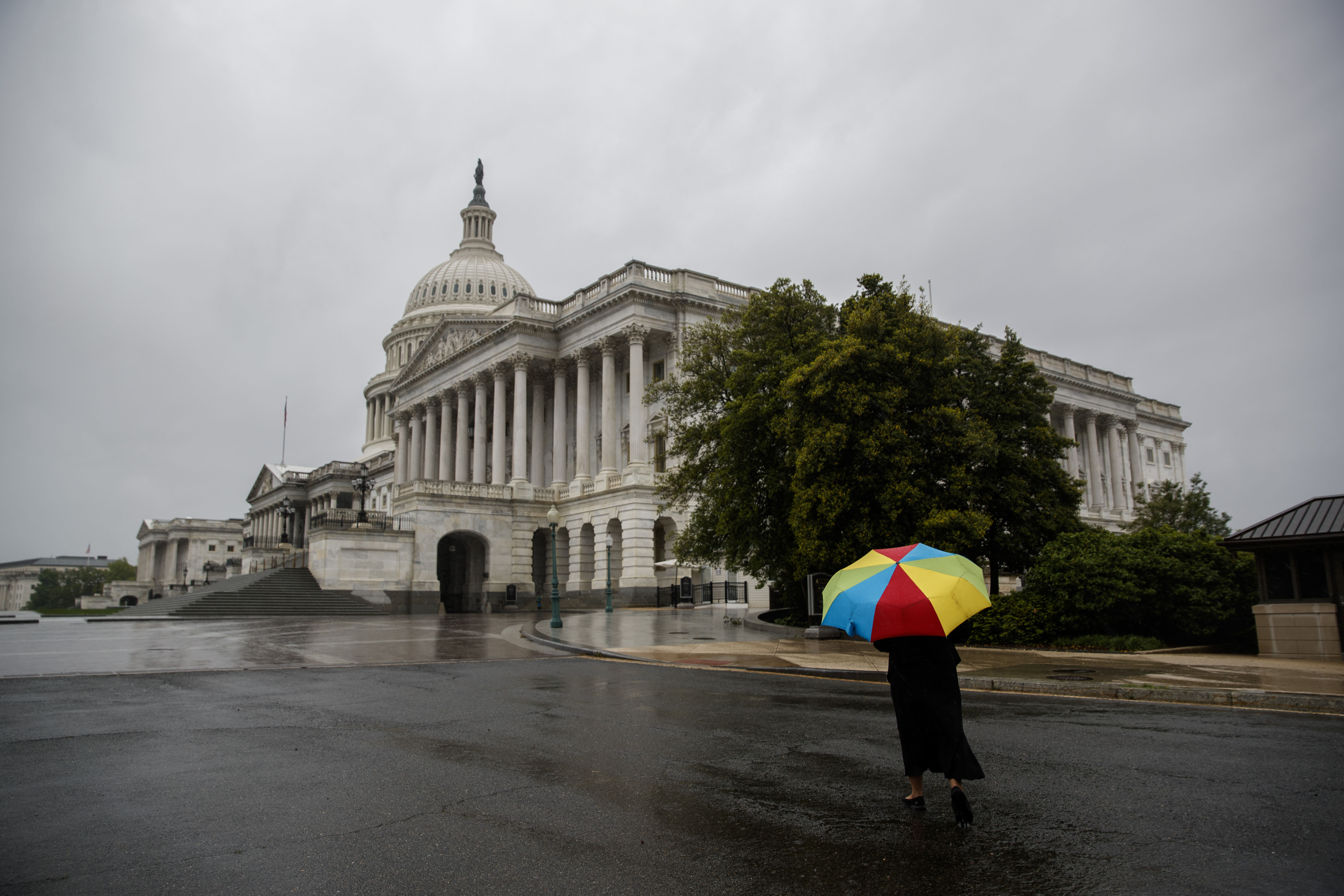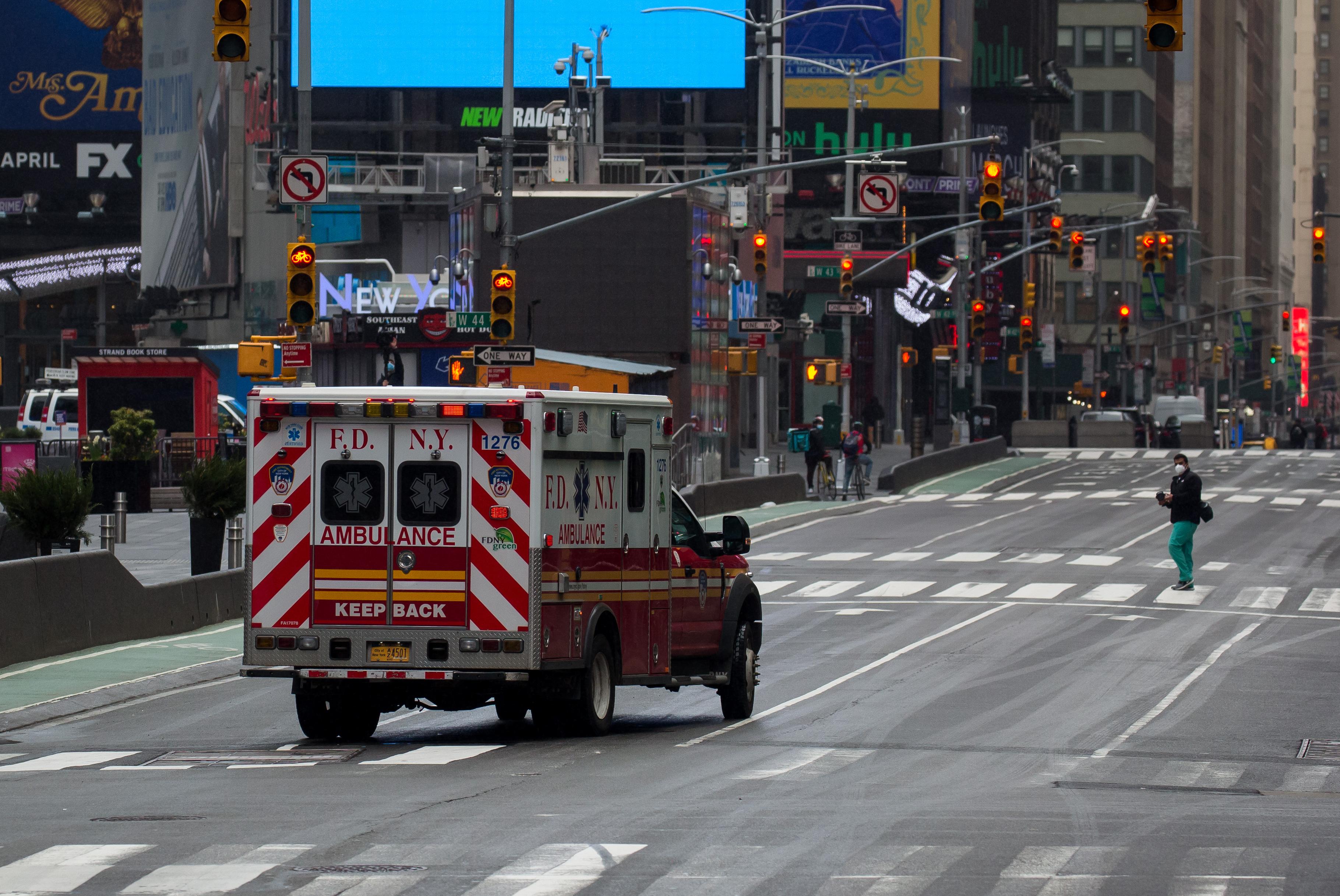

BEIJING, May 6 (Xinhua) -- When world leaders actively responded to the European Union's fundraising conference and pledged eight billion U.S. dollars for COVID-19 vaccine co-research, the United States stood aside.
Since the outbreak of the novel coronavirus, the U.S. administrations' belated response has turned the country into the epicenter of the disease and the blame game it begun has dampened the global fight against the virus.
In mid-March, U.S. President Donald Trump proclaimed himself a wartime president and the coronavirus the enemy. Since then the United States has seen infections soar on its soil, with a death toll surpassing the combined war deaths in Vietnam, Afghanistan and Iraq.
MISSED OPPORTUNITIES
Washington had several opportunities to leap ahead of the virus instead of chasing it, but chose instead to dismiss response proposals, deflect blame, and disseminate misleading information.

A person walks towards the U.S. Capitol building in Washington D.C., the United States on April 30, 2020. (Photo by Ting Shen/Xinhua)
In early January, the National Security Council office responsible for tracking pandemics received reports predicting the virus would soon spread to the United States. Within weeks proposals like shutting down cities the size of Chicago and keeping people home had been raised. The White House dismissed all of them.
By the third week in February, top health experts recommended an approach that included social distancing and teleworking, but the White House took a detached attitude, announcing that the pandemic was "under control" in the United States and everything was "going to be just fine."
Two months went by before Washington finally recommended social distancing across the nation, but by then it was too late. It is hard to believe that such a powerful and influential nation handled the health crisis so poorly.
An unfair and unaffordable healthcare system, the contest between American states for scarce medical supplies, the disproportionate death toll among ethnic minorities, and chaotic coordination demonstrated in the U.S. response have made more disenchanted with Washington's "Make America Great Again" slogan.


Medical workers transport a patient at George Washington University Hospital in Washington D.C., the United States, on April 27, 2020. (Photo by Ting Shen/Xinhua)
The slow U.S. response, on top of the well-documented failures to establish its testing capacity, brought suffering to the American people.
In March, Australian Prime Minister Scott Morrison said the United States has been the top origin for most of the COVID-19 cases in his country.
DIVERTING ATTENTION
While China appeals for international cooperation in the fight against COVID-19, Washington is busy slandering Beijing to divert attention on its own poor response to the pandemic, said a former Serbian diplomat.
The U.S. administration, instead of combating over one million cases at home, has tried its best to stigmatize China and spread false information about the new virus.
Trump said on April 14 that he would halt funding for the World Health Organization while a review covering the WHO's "role in severely mismanaging and covering up the spread of coronavirus" was being conducted.
The U.S. announcement came amid the worst global pandemic in decades and as Washington was desperate to defend its own handling of the outbreak.
The Europeans were already outraged by reported U.S. efforts to acquire monopoly rights to a coronavirus vaccine under development in Germany.


People wait to pick up food at a food bank distribution site in New York, the United States, on April 24, 2020. (Photo by Michael Nagle/Xinhua)
While the world is scrambling to come up with a vaccine, what the White House has done is a mere manifestation of nationalistic self-interest.
In early March, German government officials said they believed Washington had tried to lure a company based in southwestern Germany that was known to be working on a vaccine to move its research work to the United States.
In early April, 200,000 protective masks destined for Berlin were snatched by the United States at an airport in Thailand, in a dramatic episode which Germany later called an "act of modern piracy."
MUCH-NEEDED COOPERATION
More than 70 scholars on public health from the United States and China have urged the two countries to coordinate responses to COVID-19 in a signed letter published by The New York Times.
"Your power should be focused on caring for others and marshaling resources for disease prevention -- not on deflecting blame, shoring up approval ratings, settling scores or demonizing people because of ethnicity or nationality," read the letter.


An ambulance is seen at the Times Square in New York, the United States, on April 27, 2020. (Photo by Michael Nagle/Xinhua)
Diseases know no borders; supply chains are internationally-embedded; and crisis management necessitates intergovernmental collaboration and data sharing among scientists.
There is no place today for politicians to endanger bilateral ties by spreading conspiracies or insulting language about virological origins, said the letter.
The time has come to stop the blame game, rebuild global public health alliances, such as the WHO, renew scientific exchanges and communicate respectfully across borders.

 Award-winning photos show poverty reduction achievements in NE China's Jilin province
Award-winning photos show poverty reduction achievements in NE China's Jilin province People dance to greet advent of New Year in Ameiqituo Town, Guizhou
People dance to greet advent of New Year in Ameiqituo Town, Guizhou Fire brigade in Shanghai holds group wedding
Fire brigade in Shanghai holds group wedding Tourists enjoy ice sculptures in Datan Town, north China
Tourists enjoy ice sculptures in Datan Town, north China Sunset scenery of Dayan Pagoda in Xi'an
Sunset scenery of Dayan Pagoda in Xi'an Tourists have fun at scenic spot in Nanlong Town, NW China
Tourists have fun at scenic spot in Nanlong Town, NW China Harbin attracts tourists by making best use of ice in winter
Harbin attracts tourists by making best use of ice in winter In pics: FIS Alpine Ski Women's World Cup Slalom
In pics: FIS Alpine Ski Women's World Cup Slalom Black-necked cranes rest at reservoir in Lhunzhub County, Lhasa
Black-necked cranes rest at reservoir in Lhunzhub County, Lhasa China's FAST telescope will be available to foreign scientists in April
China's FAST telescope will be available to foreign scientists in April